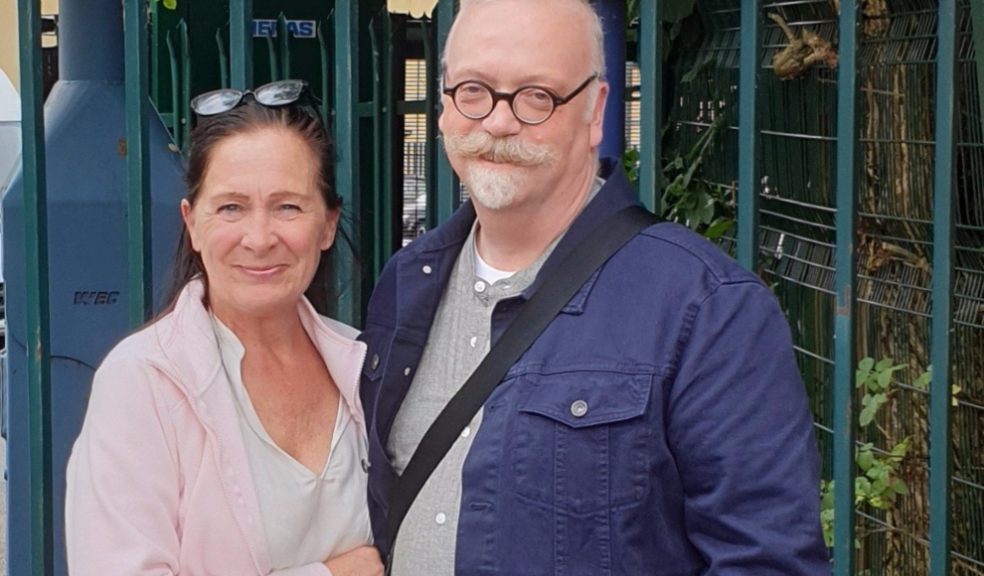
HIV on the rise among older women
HIV is on the rise among older women as they remain sexually active – but without using protection.
There has been a five-fold increase of women aged between 45 and 56 receiving care for HIV in the UK in the last ten years, a study has found.
This is partly because people are living longer with the infection due to advances in medicine - but 20 per cent of new diagnoses have been made in women aged 50 or over.
The increase has been put down to the rising divorce rate in Britain and a more liberal attitude to sex in general. Yet this group is often left out of HIV prevention, education and research.
Roland Chesters, who was given just two weeks to live after being diagnosed with HIV at a late stage, has campaigned for greater awareness and understanding about the virus.
He and another campaigner, Sue Mason, give talks about their experience of living with HIV.
Roland, a disability development consultant from Luminate, who was only tested after he attended a doctor’s appointment with his male partner, said: “It’s about time we recognised that HIV can affect people from all walks of life and is not just a concern for the gay community.
“I was lucky that as a gay man the consultant thought to test me for HIV, although at a very late stage. But misconceptions are costing lives.”
Older women can be at greater risk of acquiring HIV during sex because their vaginal walls are thinner and drier than younger women, which can cause tears in the area.
People who have come out of long marriages or who have been bereaved may be having sex with new partners for the first time and unaware of the need to use condoms.
They are also less are likely to have been screened for STDs and an infection picked up years ago - perhaps through an act of infidelity - may have gone unnoticed for a long time.
Menopause and HIV
The PRIME study (Positive Transitions Through the Menopause) is one of the largest studies of HIV and ageing in women globally.
It looked at the impact of the menopause on the health and well-being of women living with the virus.
Sometimes women had difficulty distinguishing menopausal symptoms from HIV-related symptoms.
And women who had been diagnosed with HIV would sometimes struggle to access the right menopause care – with nearly half saying they did not have enough information.
Dr Shema Tariq, who was the lead researcher on the study, said: "HIV treatment has advanced to the point where people are living long and healthy lives with HIV.
“If you look at women in particular, over the last decade we've seen a five-fold increase in the number of women living with HIV in their 40s and 50s.”
Research by HIV charities Sophia Forum and Terence Higgins Trust (THT) found women make up a third of people living with HIV in the UK. The majority contracted the virus through heterosexual sexual activity, compared to just three per cent from injecting drug use.
Case study.
Sue Mason, now 60, was 47 and had started going through the menopause when she was diagnosed with HIV.
The mum-of-one had started to date again at the age of 45, after separating from her husband of 10 years.
She met a fellow divorcee while in a bar with friends and the pair enjoyed an 18 month whirlwind romance.
Her partner, a father of a young daughter, had been just 43-years-old when he became unwell and his health rapidly deteriorated.
It was only when he was admitted to hospital for pneumonia for the second time that he was diagnosed with HIV.
He later made a personal trip to Sue’s home , to break the news.
Sue, who had worked in retail since the age of 18 and had managed a fashion department, said: “I had found myself single again at the age of 45, which felt old at the time. It was daunting to start dating again, but after a few dates I met someone I instantly clicked with
“We got on well and had a great time together, but we just couldn’t see it working long-term. We ended our relationship, but stayed good friends.
“I had many misconceptions about getting into a relationship at this age, including the idea that I didn’t need to worry about contraception because pregnancy was no longer a worry.
“It hadn’t crossed my mind that older people could get sexually transmitted infections (STIs) and there is a real lack of information for the older age groups.
“When my ex-partner told me he had HIV and said I ought to get tested, I was appalled and angry, saying ‘how dare you?’.
“I just thought HIV wasn’t something which happened to older, heterosexual women.”
Diagnosed too late
Sue’s former partner’s urged her to get tested, despite her having no symptoms of illness. Sadly, his own diagnosis came too late and he died just two weeks later.
Sue said: “He had been backwards and forwards to see doctors and his health went downhill very quickly, but nobody knew what was wrong with him until it was too late.
“I was devastated when he died. He was a lovely man and a father to a young girl. He didn’t deserve to die so young.”
Sue had been to a sexual health centre to get checked out as her own GP had advised her the test could stay on her medical notes otherwise. She went to get the results with her sister and best friend.
Sue said: “My friend said I didn’t need to worry. Like me, she thought it just didn’t affect women of a certain age. So, when I was told it was positive, we were all stunned.
“We all cried and struggled to come to terms with the diagnosis. After my ex’s death, this felt like a death sentence. It was a dark time and I will never forget it.”
Fortunately, Sue was diagnosed at an early stage of the infection. Early diagnosis and treatment means people living with HIV can expect to live as long as the general population – as well as reducing the risk of passing it on.
Sue said: “I had no signs of being unwell and it wouldn’t have entered my mind to get tested, had it not been for my ex-partner. I’m grateful to him for telling me in person as who knows what could have happened otherwise.”
HIV is treated with antiretroviral medication, which works by stopping the virus replicating in the body.
This means viral loads are reduced to undetectable levels – protecting a person’s health and preventing the infection from being passed on.
Stigma
But Sue still had to deal with the stigma attached to living with HIV – with awareness and attitudes somewhat stuck in the 1980s’ view of it being a ‘death sentence.’
She said: “Thanks to medication I can now live a healthy life, with a normal life expectancy and cannot pass on the infection.
“But I think there is still a stigma attached to HIV and I was nervous about letting people initially.
“I first thought that I had somehow deserved it. Society can be hard on people if their life choices are called into question. In time, I came to realise I hadn’t done anything wrong.”
After years of hiding her status, perhaps Sue’s most difficult decision was to tell her teenage daughter.
Sue said: “When I told my daughter she said ‘you’re going to die, aren’t you mummy?’ While I was able to reassure her about my health, I feared it could isolate her other people knew.
“In the end, my daughter decided to tell her friends I had HIV after she left school and they’ve all been really supportive about it.”
Helping others
Sue now speaks openly about her experience and works as a mentor with the London HIV Prevention Programme (LHPP), and with the Terrence Higgins Trust (THT), the UK’s leading HIV and sexual health charity.
She is a Positive Voices coordinator, a project set up to help to put an end to out-dated views of what it means to live with HIV.
Sue arranges for people with HIV and AIDS to go into school, universities and work places to share their experience and raise awareness of the virus.
Sue, who talks about living with HIV during the ‘HIV Happy Hour’ on community station RadioReverb, also started an initiative to visit GP practices after a consultant asked her how she contracted the virus.
She said: “I got fed up with keeping quiet. There are some people who are unable to speak out, so I want to keep talking until there is no longer a stigma surrounding HIV.”
Sue said there are many mental health issues around a HIV diagnosis - with some people struggling to accept they have the infection and not taking their tablets.
She had counselling to work on her self-esteem and began dating again. She experienced several knock backs because of her HIV status, but met someone on a HIV dating site.
The pair got married in the Caribbean island of St Lucia earlier this year and Sue thanks her HIV status for bringing about some positive change.
She said: “It helped to bring about a career change and I see a real value in the work with do. It’s empowering. I also work in a community with people I know and adore.”
She believes there is still a lack of information for women living with HIV going through the menopause.
She said: “I didn't go on any other medication because I was scared of the interaction with my HIV drugs. I have since come across some positive women that have gone onto HRT and were OK, but I didn’t have enough information or support at the time.”
Campaign for awareness around sexual health for the over 50s
Sue is continuing her work in memory of her late partner and for the future of her daughter’s generation, in the hope that one day they will stop the transmission of HIV
Sue is calling for a campaign around awareness of sexual health for the over 50s. She said: “We are living longer, we are paying tax longer and we are sexual active for longer. It’s time to put old fashioned assumptions behind us.”
“Some of us may have been under the illusion that HIV only affects the gay community or those who share drug infected needles. But it can happen to anyone.
“I would urge people to use contraception and to get tested for HIV. Early diagnosis can save lives – and stop the transmission of infection.”
Background:
Older women can be at greater risk of acquiring HIV during sex because their vaginal walls are thinner and drier than younger women, which can cause tears in the area.
People who have come out of long marriages or who have been bereaved may be having sex with new partners for the first time and unaware of the need to use condoms.
They are also less are likely to have been screened for STDs and an infection picked up years ago - perhaps through an act of infidelity - may have gone unnoticed for a long time.
Menopause and HIV
The PRIME study (Positive Transitions Through the Menopause) is one of the largest studies of HIV and ageing in women globally.
It looked at the impact of the menopause on the health and well-being of women living with the virus.
Sometimes women had difficulty distinguishing menopausal symptoms from HIV-related symptoms.
And women who had been diagnosed with HIV would sometimes struggle to access the right menopause care – with nearly half saying they did not have enough information.
Dr Shema Tariq, who was the lead researcher on the study, said: "HIV treatment has advanced to the point where people are living long and healthy lives with HIV.
“If you look at women in particular, over the last decade we've seen a five-fold increase in the number of women living with HIV in their 40s and 50s.”
Research by HIV charities Sophia Forum and Terence Higgins Trust (THT) found women make up a third of people living with HIV in the UK. The majority contracted the virus through heterosexual sexual activity, compared to just three per cent from injecting drug use.
References:
1. Prime study: http://hivoutcomes.eu/case_study/uk-prime-study-menopause-in-women-living-with-hiv-in-the-uk/
2. Older women and HIV: https://www.womens-health.co.uk/hiv-after-menopause.html
3. Menopause and treatment: https://patient.info/news-and-features/does-the-menopause-differ-for-women-living-with-hiv
4. Women with HIV: https://www.tht.org.uk/sites/default/files/2018-08/women-and-HIV_report_final_amended.pdf
5. Older women with HIV worldwide: https://www.thewellproject.org/hiv-information/older-women-risk-hiv













